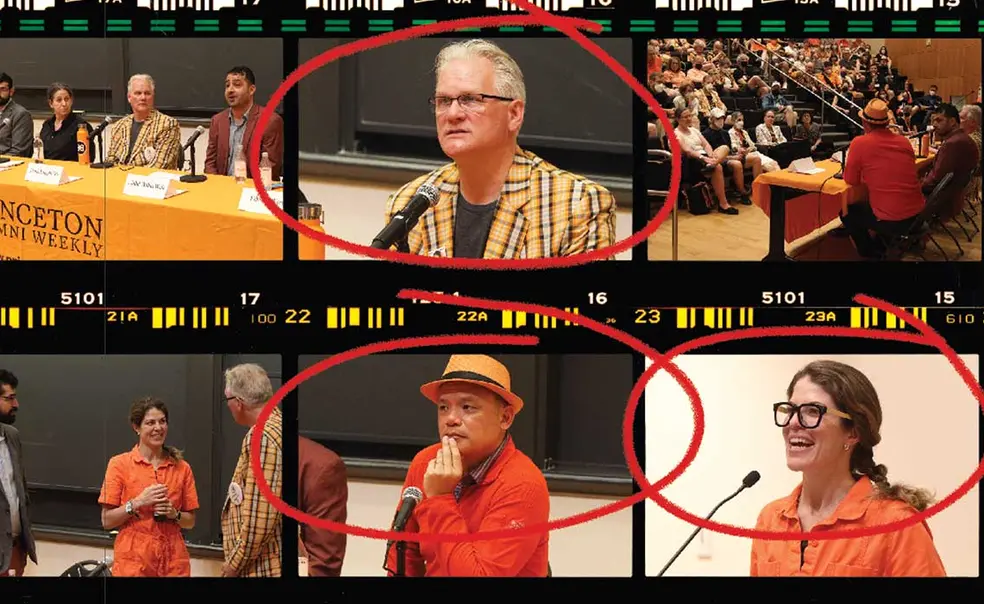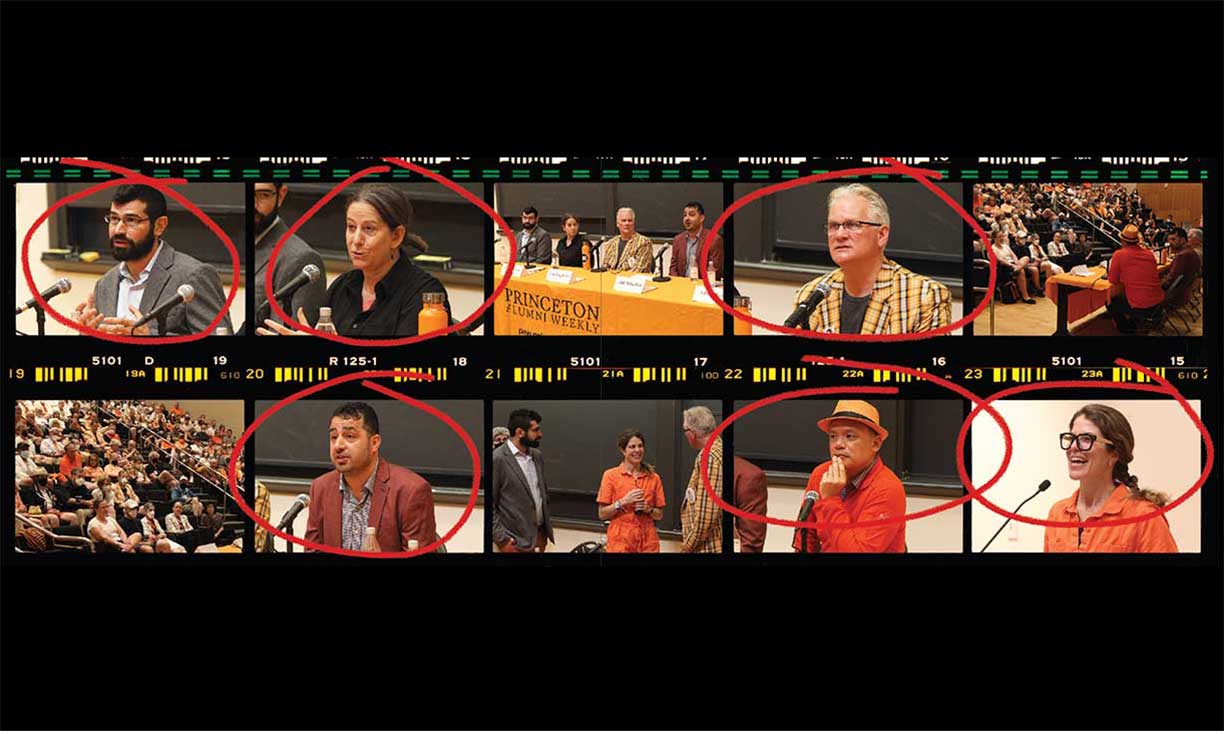In Reunions Panels, the News Was the News
The issues dominating headlines ahead of Reunions — like COVID, the war in Ukraine, and climate change — don’t qualify as good news, but they did provide fodder for compelling panel discussions. While the P-rade is always Reunions’ main event, the weekend offered dozens of options for alumni interested in a different kind of gathering.
A conversation on divestment from fossil fuels drew more than 100 people, as alumni and students discussed ways to push Princeton to end its investments in the industry, including nonviolent protest and speaking with their donations. A crowd turned out in the Arthur Lewis Auditorium to hear a panel that included ACLU director Anthony Romero ’87 discuss “We Hold These Truths to be Self-Evident: Civil Rights in America.” He noted his alarm at the likely overturning of Roe v. Wade: It “puts in play all of the other rights I have worked most of my life to secure.”
With issues like these keeping reporters busy, it’s no surprise that some panels focused on journalism. At “From Kabul to Kyiv: International Correspondents Review the News and How It is Covered,” reporters provided a view into how international reports are produced and the challenges journalists face abroad. The discussion, moderated by Gloria Riviera ’96 of ABC News, drew more than 250 people.
NPR’s Frank Langfitt ’86 was covering the war in Ukraine just days before Reunions. He recalled meeting President Volodymyr Zelenskyy shortly before Russia invaded. Reporters at that meeting were worried: Zelenskyy was standing in a street in Kyiv, with little security, appearing disheveled and disorganized. How was such a man going to lead Ukraine in a war against the Russians? Langfitt wondered.
He soon had his answer: Zelenskyy was “a very good actor,” which is just what Ukraine needed in the moment — along with Ukrainians’ skill in messaging and social media. Langfitt pointed to a now-famous video of Zelenskyy, surrounded by other Ukrainian leaders, proclaiming, “We are all here,” and signaling that they would remain. “What he was able to do in that moment with that video was rally his country,” Langfitt said. “I think when the history is written about this war, that will be a critical turning point for the Ukrainian people.”
Others on the panel — which was sponsored by PAW and the Humanities Council’s Program in Journalism — discussed the difficulties of getting good information. Noah Arjomand ’10, a sociologist and filmmaker, noted the role of local reporters who help international journalists get what they need when working abroad. New York Times reporter Edward Wong, a former Ferris professor at Princeton, said one of the most difficult things he encountered in reporting about China was finding out what the people in power were thinking — a challenge the journalists said also applies to Russia’s Vladimir Putin.
Responding to an alum’s question about how journalists keep American readers’ attention, the panelists agreed that they look for stories that connect through human interest.
“Most people, wherever you go, care about the same things,” said foreign correspondent and author Barbara Demick. “They want to get their kids educated; they want to take care of their elderly parents, if they’re people our age; they want to get educated; they want to fall in love.”
Wahid Wafa, an Afghan journalist now working in Princeton’s journalism program, lamented that as the Ukraine story grew in importance, coverage of the ongoing crisis in Afghanistan has waned. Other panelists attributed this to a sense that Ukrainians appear “more like us” and that a war with the Russians in Europe is simply a huge story. And at least for now, they suggested, the conflict also seemed to have both hero and villain.
Demick explained: “As soon as it’s no longer good versus evil, [interest] fades.”
At another popular panel on journalism, a forum titled “The News About the News,” participants focused on the media at home, including the polarization in where Americans get their information.
“If you want something Cronkite-like, something right down the middle, I don’t know where you’d go,” said Andrew Napolitano ’72, a judicial analyst and former Fox News contributor.
Did the Walter Cronkite era really exist, or were those the halcyon days only in comparison to today? one alum asked. Journalist and University of Missouri journalism school professor Kathy Kiely ’77, a Princeton trustee, noted that while the Cronkite days had many virtues, “they were not the golden era of journalism for many people in this country,” referring to women, Black people, and members of other minority groups. Today, journalism has been “democratized.”
But there’s a downside to that, too, she continued: “When you democratize media, anybody and everybody can be a publisher. Unfortunately, many of the people who are publishing have not been trained as reporters.” That puts a greater burden on consumers of news to be their own “gatekeepers,” she said. While we might think that we’re getting our news for free when we rely on sites like Facebook and other social-media platforms, Kiely pointed out that we’re paying for that news with our personal data. “Your confirmation bias is being exacerbated and enhanced by these sites saying, ‘If you like this, you might like that.’”
As a result, suggested Catherine Rampell ’07, an opinion columnist at The Washington Post and a contributor to CNN, people today can be less informed even though they have access to more information, because “they are only seeking out outlets that validate their views.”
An alum in the audience asked how the problem of disinformation might be solved. Kiely said there’s an app for that: “It doesn’t require a power source, and you have it with you all the time — it’s the one between your ears!” she said. “We want this to be a superspreader event for a really good virus: common sense.”













No responses yet